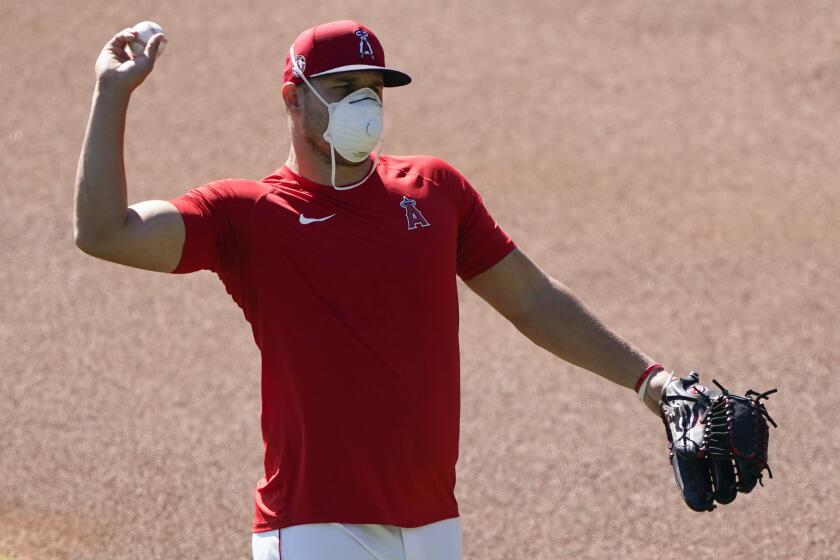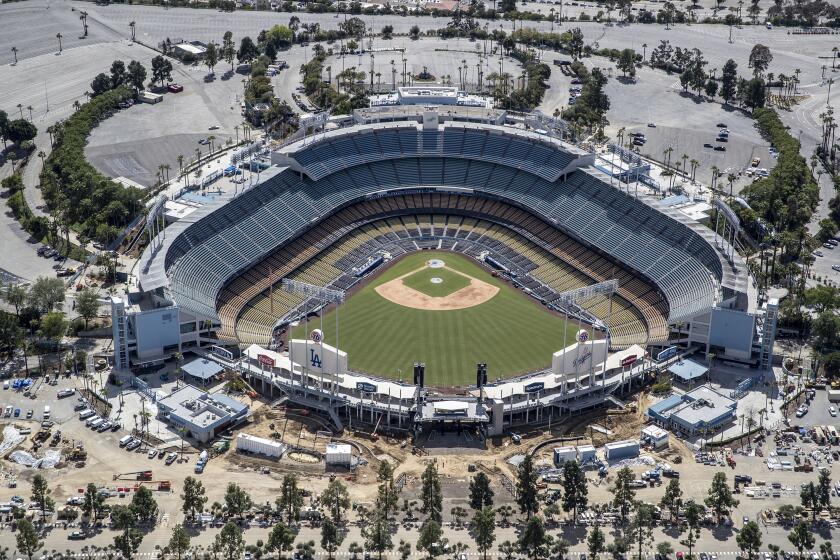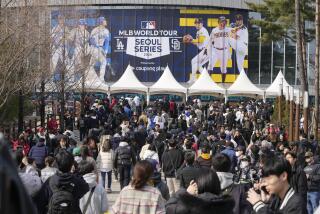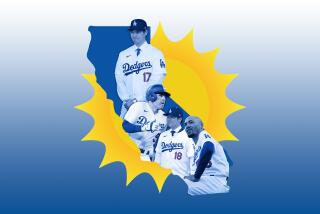Is this the safest schedule MLB could put together? Experts are split
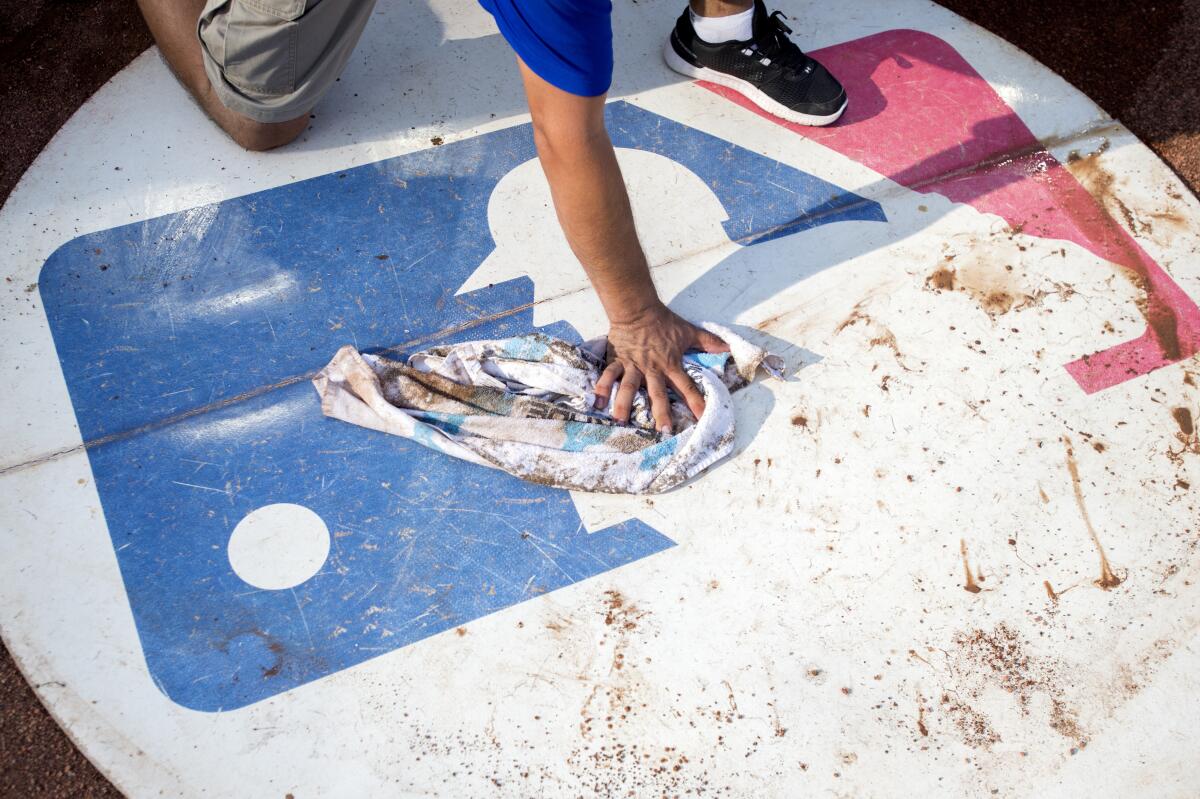
In a pandemic-shortened regular season dedicated to risk management, with bans on everything from fans to spitting, the Major League Baseball schedule unveiled Monday arguably forces each team to take five more trips than necessary.
“You want to minimize travel, absolutely,” said Dr. Dena Grayson, a Florida-based pandemic expert. “That would help to decrease the risk.”
Each team plays 10 games against each of the other four teams in its division. However, rather than split those 10 games into a five-game home series and a five-game road series, the league has divided them into three series.
And, even though each team plays a home and road series against no more than two interleague opponents during the traditional 162-game season, this 60-game schedule compels teams to play a home and road series against three interleague opponents.
The Angels take two trips to Oakland and two to Arlington, Texas, for instance. The Dodgers play home and road series against the Houston Astros and Seattle Mariners — in the latter case, playing the Mariners in Los Angeles on a Monday and Tuesday, flying to Seattle for games Wednesday and Thursday, then flying back to Los Angeles on Thursday night.
The Dodgers will travel 10,291 miles, the ninth-most in the majors, while the Angels will travel 10,457, seventh-most.
MLB’s sample collectors didn’t show up at Angel Stadium on Sunday, prompting players to administer their own tests. The issue continued Monday with other teams.
Each trip means increasing the personal interactions that can maximize exposure to the virus, Grayson said. The two-game series are particularly problematic, she said, because players can be infected before they are tested and unknowingly carry the virus to another city.
“You’re basically amplifying the ability of this virus to spread, which is the last thing that needs to get done,” Grayson said. “If Major League Baseball really wants to try to have a season, which I think is going to be challenging at best, it would be wise to reduce travel as much as possible.”
Those factors were considered as the league office negotiated with the players’ union, which is required to approve the schedule. The parties also considered whether too many days in the same city might increase the temptation for a player to leave his hotel room, making it more likely that he could contract the virus from exposure within the community.
In addition, according to a league official, the parties were concerned about whether fans would tune in for five-game series against opponents that aren’t rivals.
Dr. Zachary Binney, an epidemiologist at Emory University in Atlanta, said the MLB travel protocol appeared reasonable.
“Every time you travel could add some risk,” Binney said. “But we haven’t been able to trace any outbreaks back to planes. Not one. So, if you’re somewhat spread out and wearing masks, and the plane — like most planes — is equipped with HEPA [high-efficiency] filters that can filter out the virus when the air circulates, the additional risk may not be that high for spread within the team.”
The Dodgers will open the 2020 season at home with a four-games series against the San Francisco Giants before playing the Houston Astros on the road.
Binney agreed with the logic of not keeping players in the same hotel room for five or six days.
“The biggest concern is the time you’re spending in the market,” he said. “There’s more chances for somebody to get feisty and leave the hotel, for example, and then spread the disease from one market to another.
“If you think you can keep them in the hotel for three days twice, I think I would trade a plane trip for that.”
Angels manager Joe Maddon said the team must “secure our perimeter,” including plane rides and hotel stays, but said he is confident the league’s travel plans have been “well thought out.”
Said Maddon : “I have to have confidence. I have to believe that. If I don’t believe that, then don’t do this. Either you believe it or you don’t, and I do.”
DODGERS 2020 REGULAR-SEASON SCHEDULE
July 23-26: Giants at Dodgers
July 28-29: Dodgers at Astros
July 30-Aug. 2: Dodgers at Diamondbacks
Aug. 3-5: Dodgers at Padres
Aug. 7-9: Giants at Dodgers
Aug. 10-13: Padres at Dodgers
Aug. 14-16: Dodgers at Angels
Aug. 17-18: Mariners at Dodgers
Aug. 19-20: Dodgers at Mariners
Aug. 21-23: Rockies at Dodgers
Aug. 25-27: Dodgers at Giants
Aug. 28-30: Dodgers at Rangers
Sept. 1-3: Diamondbacks at Dodgers
Sept. 4-6: Rockies at Dodgers
Sept. 8-10: Dodgers at Diamondbacks
Sept. 12-13: Astros at Dodgers
Sept. 14-16: Dodgers at Padres
Sept. 17-20: Dodgers at Rockies
Sept. 22-24: Athletics at Dodgers
Sept. 25-27: Angels at Dodgers
ANGELS 2020 REGULAR-SEASON SCHEDULE
July 24-27: Angels at Athletics
July 28-30: Mariners at Angels
July 31-Aug.2: Astros at Angels
Aug. 4-6: Angels at Mariners
Aug. 7-9: Angels at Rangers
Aug. 10-12: Athletics at Angels
Aug. 14-16: Dodgers at Angels
Aug. 17-18: Giants at Angels
Aug. 19-20: Angels at Giants
Aug. 21-23: Angels at Athletics
Aug. 24-27: Angels at Astros
Aug. 28-31: Mariners at Angels
Sept. 2-3: Padres at Angels
Sept. 4-6: Astros at Angels
Sept. 9-10: Angels at Rangers
Sept. 11-13: Angels at Rockies
Sept. 15-17: Diamondbacks at Angels
Sept. 18-21: Rangers at Angels
Sept. 22-23: Angels at Padres
Sept. 25-27: Angels at Dodgers
More to Read
Are you a true-blue fan?
Get our Dodgers Dugout newsletter for insights, news and much more.
You may occasionally receive promotional content from the Los Angeles Times.

